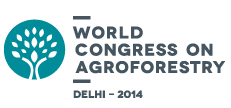Migrants and land markets in Jambi, Indonesia: the prospect of agroforestry development in peatland
Migrants and land markets in Jambi, Indonesia: the prospect of agroforestry development in peatland
wca2014-1956 Gamma Galudra 1,*Meine van Noordwijk 1Putra Agung 1Suyanto Suyanto 1Ujjwal Pradhan 1 1SD 5, World Agroforestry Centre, Bogor, IndonesiaPolicies designed to promote agroforestry development require a good understanding of the complex connections between state-sanctioned concessions, forest conversion, informal land markets and migrants. Our case study in the peat forests of the Tanjung Jabung Barat (TanJaBar) regency of Jambi aimed to explore relations between four key stakeholder groups: the state, local communities, migrants, and state-sanctioned concessions and how these relationships affect the land use patterns. We hypothesized that current land use patterns are shaped by insecurity in formal forest tenure alongside informal land tenure arrangements with migrants.
In analyzing the six two-way relationships between the four stakeholder groups, we found that interactions between the stakeholders have changed local norms and practice, causing land conflicts and contested claims that need to be explicitly addressed in efforts to promote agroforestry development in TanJaBar. Relational concepts of land rights between migrants and local community are informed by social identity, expectations of investment opportunities, insecure customary forest tenure and competing land use policies. These concepts at the end determine the land use patterns. Migrants act as intermediaries in shaping the land tenure system and creating a new balance of power between local communities, the government authorities and business concessions.
The Government of Indonesia (GoI) promotes national agroforestry development programs under different schemes of community based forest management (CBFM). However, we conclude that effective and equitable implementation of national agroforestry development programs will need to recognize underlying land ownership dynamics, power struggles and strategic positioning among stakeholders across scales. It is increasingly important to consider migrants, migration and the emergence of land markets as part of the agroforestry development programs.

